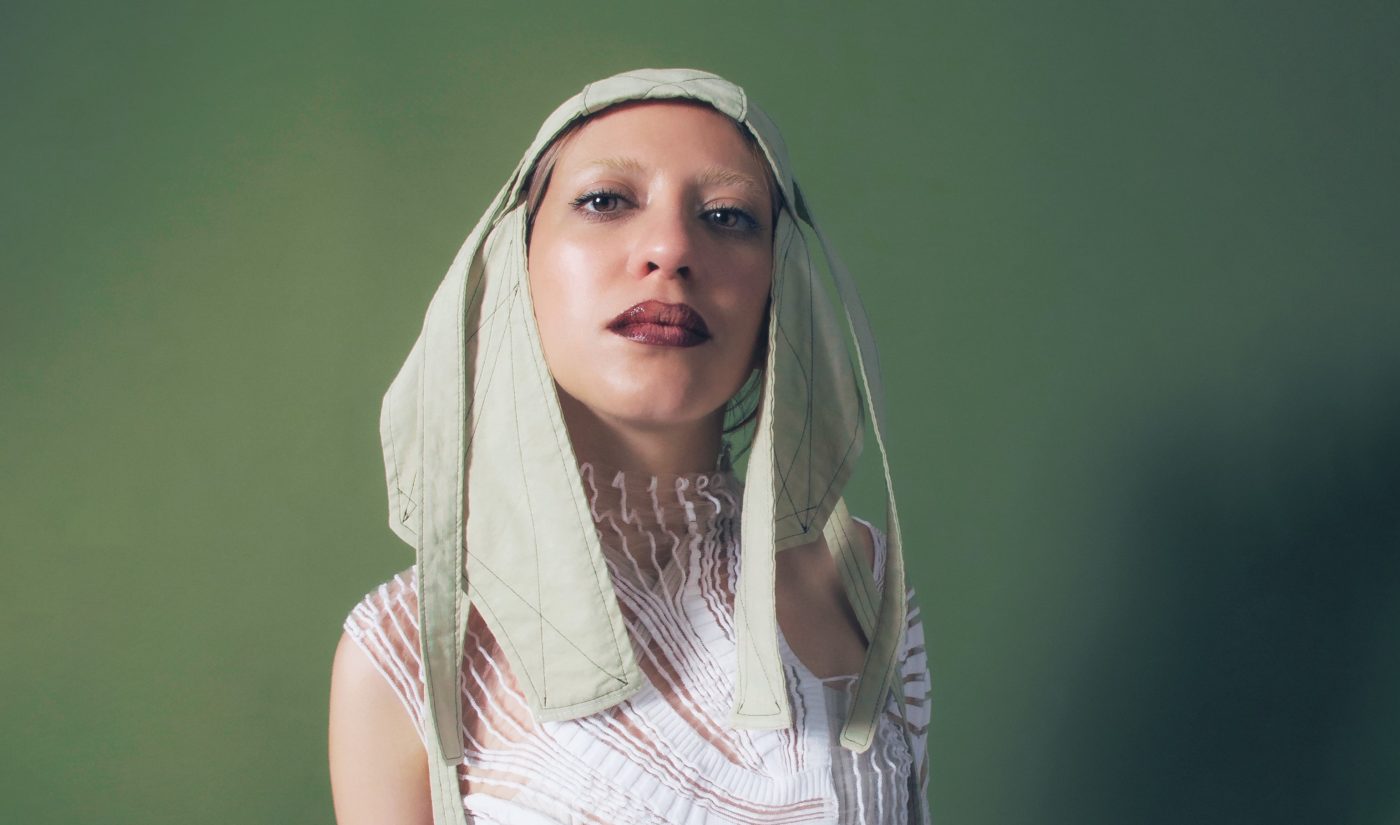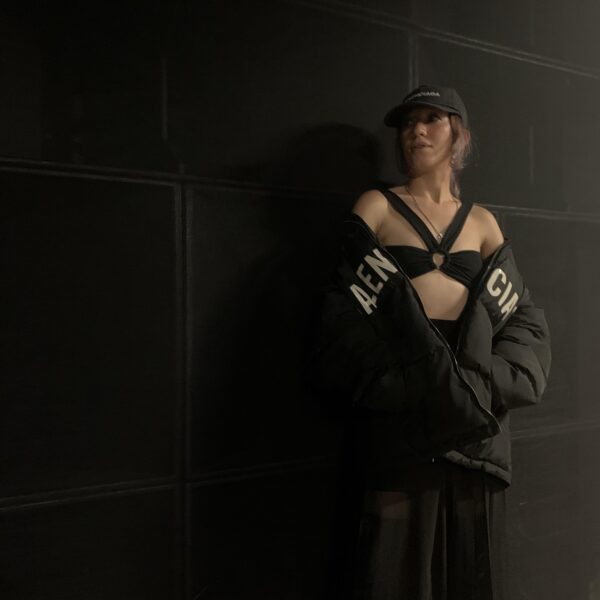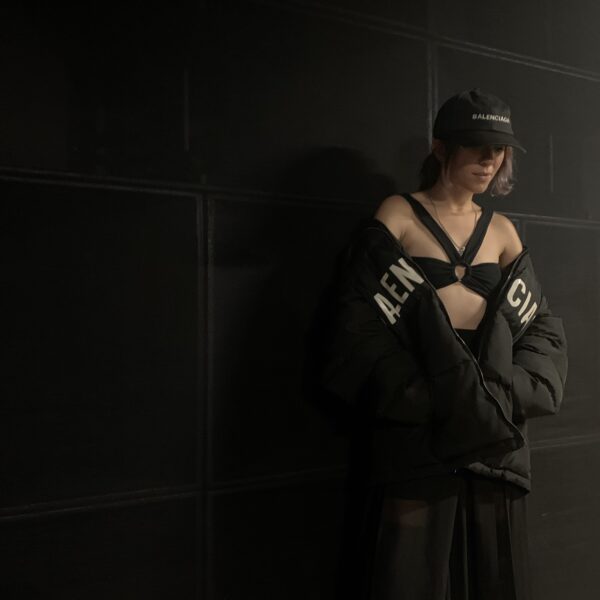The tempo in Jaeger’s basement is creeping up to that 150BPM mark. It’s not even midnight yet, but people are literally bouncing off the walls as they push past the wall of bass to get a glimpse of the DJ. I’ve become accustomed to hearing these excessive tempos recently, but there is something unique to this particular experience. Where those tempos usually exist for saccharine melodies inverted in some functionalist dystopia, there is something more enticing and esoteric about what I’m hearing at this moment. Exotic textures, heavily borrowed from African and Arab traditions, weave through monstrous electronic kick drums to make an intricate lattice of unique rhythm structures and ethereal melodies.
This is Glitter 55 in full effect. The Moroccan DJ has cultivated a unique sound as a DJ over the last 5 years as she consolidates music from the Arab World and Africa with the stark sound of western electronic music. “I play music from the UK and US – bass music mainly”, she confirms, “and I try to put some influences from home or from Africa in there.” Home is officially in Rabat, but Glitter 55 speaks in a melodious French accent, the Morocco inflections softened by years spent in France. She introduces herself as Manar and we sit down in the backyard to the sounds of House music playing in the background. She’s just finished her soundcheck, and I was lucky enough to get a private sonic glimpse for the night ahead.
Her sound unfolds like a collage of disparate influences of a global diaspora, deconstructed and re-assembled for the purpose of the dance floor. At heart of it all is her unique musical heritage. Taking elements of “percussion from local (Moroccan) music called Chaabi”, “vocals from Raï” or drums from South Africa’s gqom artists like DJ Lag, Glitter 55 reconstitutes these pieces alongside those UK and US bass sounds that she finds via soundcloud and bandcamp. It lends a well-travelled aesthetic to musical constructions that would be familiar to any club goer, especially those that came out to hear her play for Oslo World on the night. It’s world music, not in its truncated form as a non-western music, but rather in its most obvious description. It’s music that truly represents the world, or at least more of it than just one region.
It’s a sound Glitter 55 seems to embody in personality more than just taste with very few references or similarities being drawn to other DJs or artists. In a mere five years she has created the type of artistic identity in a sound that usually takes a lifetime to master, starting with a passion for music and leading to Djing; her Frissa nights (“It means chop chop, always in a hurry, and a big mess”) and soon the recorded format (“Hopefully it will be released next year”) consolidating all her early influences and contemporary electronic music.
Growing up in Rabat, Morocco, Glitter 55 was exposed to music from all over the world from a young age. Her mother listened largely to “Egyptian music” while her father gravitated towards the “fusion” pop sounds of something like the Moroccan equivalent of “the beatles”. She also remembers her “uncle listened to a lot of French pop music” and she still admires pop music with everything from “Egyptian and Lebanese pop,” to “Dua Lipa” informing her tastes today. Hearing all these “different styles of music… growing up” instilled an early passion for music, leading to enrolling in the Royal Gendarmerie’s music conservatory at a very young age, where she studied “music theory and singing”.
At 16 she moved to France, arriving at Amiens, before moving to “Lille to study cultural studies and then to Paris.” It was in Paris where she started working as “an agent in the music industry”. Taking care of Arabic artists like Tinariwen amongst other things, she was certainly busy in the scene, but had made no significant steps towards her own career as a DJ until later. If she was a precocious music talent it’s hard to know at this point, because she worked largely behind the scenes, but there was clearly a nascent talent when she took to the decks for the first time.
“I had a friend who was promoting a party, and was doing everything during the party,” she recalls about her first furore into Djing. “He was having issues with a band, and he asked me to play some songs for 10 minutes. I was like, ‘no, I don’t know how to use this machine.’” It went from trepidation to excitement, but she quickly found an experience she “enjoyed a lot” and wanted to learn more. “Thanks to youtube” and “a lot of tutorials” she learnt the basics and started taking her first steps towards a DJ career. She took on the name Glitter 55 as an homage to her Grandma (55 representing the evil eye of local tradition) and her personal affection for glitter socks (which I hadn’t noticed she was wearing on the night) and set on a course to a career in Djing alongside her work in the industry.
Manar had not been a stranger to DJing and electronic music in Morocco however. Attending “some festivals” and “rave parties,” she encountered a sound that leaned to “Trance and psychedelic stuff and hard Techno,” but it wasn’t until she started DJing herself that she started to explore the vast expanse of her own musical influences. It’s “music from Morocco or Africa, mixed with music that I love and discovered in France,” she considers.
Today she “can play hard Techno and Disco and other stuff,” interwoven with those Arabic and African influences. With few others exploring these eclectic dimensions from the booth today, she has been left largely to her own devices and has prospected the limits of her own formative tastes extensively through her sets and her radio show on Rinse FM.
A mere two years after making her debut as a DJ Glitter 55 was inducted in the Rinse FM family as a resident for their French station and soon thereafter started playing around Europe and further afield. She “was amazed” when the call from Rinse FM came so soon after picking up DJing, but she is certainly a unique entity on the Radio’s programming schedule today. Her show “Atay Time” sees her “invite the artists that I love” from “all over the world” retaining that obvious connection with her own roots as guests like Lara Sarkissian and Jabes represent a vast global diaspora.
Artists and DJs like these and Glitter 55 herself have brought a distinctive Arab sound to these western contexts in what is beginning to feel more than just a moment for our scene. Ignoring for a moment that people like Acid Arab and Asian Dub Foundation have experimented with Arab and Eastern sounds in electronic club music for some time, artists like Glitter 55 are breathing a new life into the clubbing landscape, by bringing something unique and contemporary to fore.
In Paris, she has found a scene that shares the ideology. “It’s not a specific place,” however, “it’s different venues and promoted by collectives, who get people from all across the Arab world.” It’s “represented by artists from Africa living in Paris,” people like ”Deena Abdelwahed from Tunisia” but it’s not merely contained in Paris either. It’s also “in Amsterdam, where there’s a lot of parties being promoted by people from the Arab world.”
The sound has reached Oslo too on occasion, with the likes of Sama AbdulHadi and Omar Soleymann making visits to Norway in the recent past and it certainly has captured an audience here too as we witnessed from the turn out for Glitter 55 and Acid Arab for the Oslo World event.
Even within that wider appreciation for Arab and African sounds within a western musical dialect, Glitter 55 remains different. Her Chaabi influence which is “more about the melody and the drums, the rhythmic structures of the sound” make for interesting bedfellows with the bass heavy rhythms of gqom and the blank slate that Techno and Bass music provides for these sounds as a platform. “You can mix the two quite easily,” says Manar “with the rhythmic structure” finding an interesting sympathy between genres like “bass music” and the very same “Egyptian music” she grew up listening to as a child. It’s music that resonates with western audiences as well their African and Arab counterparts, with the only difference being that “people sing along” to the music back home.
People might not be singing along to the music at Jaeger on the night, but regardless, it’s made an indelible mark on the crowd as the 150 beats per minute subsides into quiet before a cheer erupts in the quiet.





